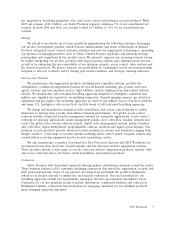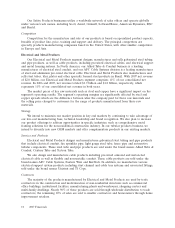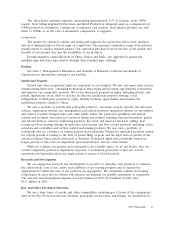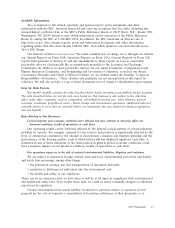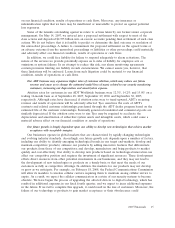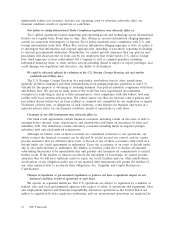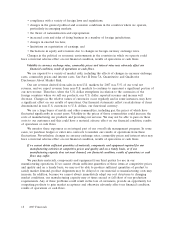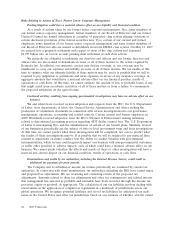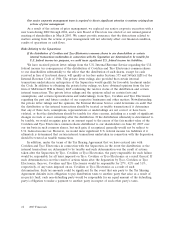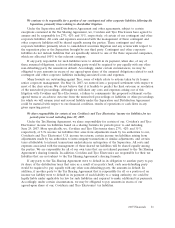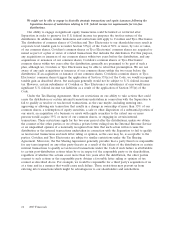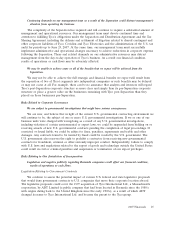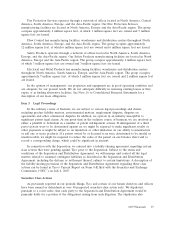ADT 2007 Annual Report Download - page 109
Download and view the complete annual report
Please find page 109 of the 2007 ADT annual report below. You can navigate through the pages in the report by either clicking on the pages listed below, or by using the keyword search tool below to find specific information within the annual report.the countries in which they operate. We and our employees are subject to various U.S. federal, state
and local laws and regulations, as well as non-U.S. laws and regulations, including many related to
consumer protection. Most states in which we operate have licensing laws covering the monitored
security services industry and the construction industry. Our business relies heavily upon wireline
telephone service to communicate signals, and wireline telephone companies are regulated by both the
federal and state governments. Changes in laws or regulations could require us to change the way we
operate, which could increase costs or otherwise disrupt operations. In addition, failure to comply with
any applicable laws or regulations could result in substantial fines or revocation of our operating
permits and licenses. If laws and regulations changed or we failed to comply, our financial condition,
results of operations or cash flows could be materially and adversely affected.
Legislative and other measures that may be taken by U.S. governmental authorities could materially
increase our tax burden or otherwise adversely affect our financial conditions, results of operations or
cash flows.
We continue to assess the impact of various U.S. federal and state legislative proposals, and
modifications to existing tax treaties between the United States and foreign countries, that could result
in a material increase in our U.S. federal and state taxes. In October 2004, the U.S. Congress enacted
legislation affecting the tax treatment of U.S. companies that have undertaken certain types of
expatriation transactions. Such legislation did not, however, retroactively apply to the 1997 acquisition
of Tyco International Ltd. by ADT Limited. More recently, several proposals have been introduced in
the U.S. House of Representatives that, if ultimately enacted by the U.S. Congress, would have limited
treaty benefits on certain payments made by our U.S. subsidiaries to non-U.S. affiliates. We cannot
predict the outcome of any specific legislative proposals. However, if such proposals were to be
enacted, or if modifications were to be made to certain existing tax treaties, the consequences could
have a materially adverse impact on Tyco, including increasing our tax burden, increasing costs of our
tax compliance or otherwise adversely affecting our financial condition, results of operations or cash
flows.
We could face product liability claims relating to products we manufacture or install. These claims could
result in significant costs and liabilities and reduce our profitability.
We face exposure to product liability claims in the event that any of our products results in
personal injury or property damage. In the event that any of our products prove to be defective, we
may be required to recall or redesign such products, which could result in significant unexpected costs.
Any insurance we maintain may not be available on terms acceptable to us or such coverage may not
be adequate for liabilities actually incurred. Any claim or product recall could result in adverse
publicity against us, which could adversely affect our financial condition, results of operations or cash
flows.
We have significant foreign operations, which are subject to political, economic and other risks inherent
in operating in foreign countries.
We have significant operations outside of the United States. We currently operate in approximately
60 countries. We generated 53% of our net revenue outside of the United States in 2007. We expect
net revenue generated outside of the United States to continue to represent a significant portion of
total net revenue. Business operations outside of the United States are subject to political, economic
and other risks inherent in operating in certain countries, such as:
• the difficulty of enforcing agreements, collecting receivables and protecting assets through
foreign legal systems;
• trade protection measures and import or export licensing requirements;
• difficulty in staffing and managing widespread operations and the application of foreign labor
regulations;
2007 Financials 17




